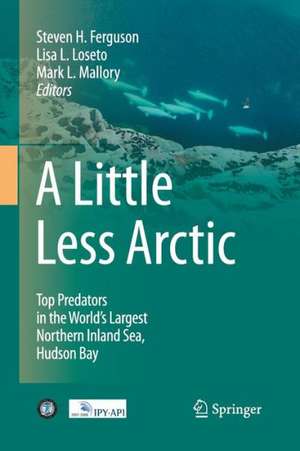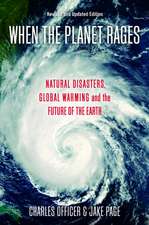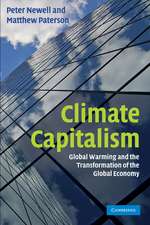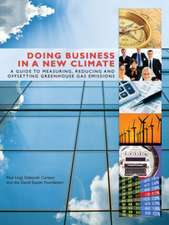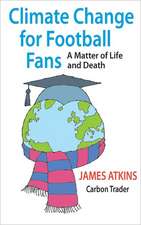A Little Less Arctic: Top Predators in the World's Largest Northern Inland Sea, Hudson Bay
Editat de Steven H. Ferguson, Lisa L. Loseto, Mark L. Malloryen Limba Engleză Paperback – 6 noi 2014
| Toate formatele și edițiile | Preț | Express |
|---|---|---|
| Paperback (1) | 945.92 lei 43-57 zile | |
| SPRINGER NETHERLANDS – 6 noi 2014 | 945.92 lei 43-57 zile | |
| Hardback (1) | 948.92 lei 43-57 zile | |
| SPRINGER NETHERLANDS – 6 mai 2010 | 948.92 lei 43-57 zile |
Preț: 945.92 lei
Preț vechi: 1153.57 lei
-18% Nou
Puncte Express: 1419
Preț estimativ în valută:
181.02€ • 187.84$ • 151.30£
181.02€ • 187.84$ • 151.30£
Carte tipărită la comandă
Livrare economică 17-31 martie
Preluare comenzi: 021 569.72.76
Specificații
ISBN-13: 9789400793903
ISBN-10: 9400793901
Pagini: 328
Ilustrații: XVI, 308 p.
Dimensiuni: 155 x 235 x 17 mm
Greutate: 0.46 kg
Ediția:2010
Editura: SPRINGER NETHERLANDS
Colecția Springer
Locul publicării:Dordrecht, Netherlands
ISBN-10: 9400793901
Pagini: 328
Ilustrații: XVI, 308 p.
Dimensiuni: 155 x 235 x 17 mm
Greutate: 0.46 kg
Ediția:2010
Editura: SPRINGER NETHERLANDS
Colecția Springer
Locul publicării:Dordrecht, Netherlands
Public țintă
GraduateCuprins
The Ocean-Sea Ice-Atmosphere System of the Hudson Bay Complex.- Changing Sea Ice Conditions in Hudson Bay, 1980–2005.- Importance of Eating Capelin: Unique Dietary Habits of Hudson Bay Beluga.- Migration Route and Seasonal Home Range of the Northern Hudson Bay Narwhal (Monodon monoceros).- Polar Bear Ecology and Management in Hudson Bay in the Face of Climate Change.- The Rise of Killer Whales as a Major Arctic Predator.- Hudson Bay Ringed Seal: Ecology in a Warming Climate.- Past, Present, and Future for Bowhead Whales (Balaena mysticetus) in Northwest Hudson Bay.- Effects of Climate Change, Altered Sea-Ice Distribution and Seasonal Phenology on Marine Birds.- Temporal Trends in Beluga, Narwhal and Walrus Mercury Levels: Links to Climate Change.- Hudson Bay Ecosystem: Past, Present, and Future.- Population Genetics of Hudson Bay Marine Mammals: Current Knowledge and Future Risks.- Understanding and Managing Wildlife in Hudson Bay Under a Changing Climate: Some Recent Contributions From Inuit and Cree Ecological Knowledge.- The Future of Hudson Bay: New Directions and Research Needs.
Recenzii
From the reviews:
“Northern Canada’s Hudson Bay stretches north into Arctic waters where climate change is proceeding most rapidly. This 14-chapter work covers the physical environment (sea ice), food chain (capelin), marine mammals (beluga, narwhal, polar bear, orca, bowhead, ringed seal, walrus), and seabirds. Climate change and sea ice change are a central theme throughout. … Extensive references for each chapter; well illustrated. Summing Up: Recommended. Academic and professional collections, all levels.” (J. Burger, Choice, Vol. 48 (6), February, 2011)
“A Little Less Arctic: Top Predators in the World’s Largest Northern Inland Sea is an edited compendium of the state of various predators (e.g., killer whales, polar bears) in the Hudson Bay Complex … . By providing a comprehensive overview of the current developments transpiring in the HBC, the book does provide senior undergraduates, graduate students and other individuals interested in this area with a good overview of the current ecological changes in the HBC.” (Raynald Harvey Lemelin, Human Ecology, Vol. 39, 2011)
“This book is a diverse compendium of work from a multitude of scientists, examining various predatory species in the Arctic versus the effects of climate change and the history and projected future of the Hudson Bay. … I very much enjoyed the papers presented in this book … . recommend this book to anyone looking to learn about the current issues facing this unique setting, the flora and fauna contained therein, and the efforts of dedicated scientists to unravel the mysteries of a changing habitat.” (Mike Pool, Aquatic Mammals, Vol. 39 (1), 2013)
“Northern Canada’s Hudson Bay stretches north into Arctic waters where climate change is proceeding most rapidly. This 14-chapter work covers the physical environment (sea ice), food chain (capelin), marine mammals (beluga, narwhal, polar bear, orca, bowhead, ringed seal, walrus), and seabirds. Climate change and sea ice change are a central theme throughout. … Extensive references for each chapter; well illustrated. Summing Up: Recommended. Academic and professional collections, all levels.” (J. Burger, Choice, Vol. 48 (6), February, 2011)
“A Little Less Arctic: Top Predators in the World’s Largest Northern Inland Sea is an edited compendium of the state of various predators (e.g., killer whales, polar bears) in the Hudson Bay Complex … . By providing a comprehensive overview of the current developments transpiring in the HBC, the book does provide senior undergraduates, graduate students and other individuals interested in this area with a good overview of the current ecological changes in the HBC.” (Raynald Harvey Lemelin, Human Ecology, Vol. 39, 2011)
“This book is a diverse compendium of work from a multitude of scientists, examining various predatory species in the Arctic versus the effects of climate change and the history and projected future of the Hudson Bay. … I very much enjoyed the papers presented in this book … . recommend this book to anyone looking to learn about the current issues facing this unique setting, the flora and fauna contained therein, and the efforts of dedicated scientists to unravel the mysteries of a changing habitat.” (Mike Pool, Aquatic Mammals, Vol. 39 (1), 2013)
Notă biografică
Textul de pe ultima copertă
In Arctic Canada, Hudson Bay is a site of great exploration history, aboriginal culture, and a vast marine wilderness supporting large populations of marine mammals and birds. These include some of the most iconic Arctic animals like beluga, narwhal, bowhead whales, and polar bears. Due to the challenges of conducting field research in this region, some of the mysteries of where these animals move, and how they are able to survive in such seemingly inhospitable, ice-choked habitats are just now being unlocked. For example, are polar bears being replaced by killer whales? This new information could not be more salient, as the Hudson Bay Region is undergoing rapid environmental change due to global warming, as well as increased pressures from industrial development interests. A Little Less Arctic brings together some of the world’s leading Arctic scientists to present the current state of knowledge on the physical and biological characteristics of Hudson Bay and in particular the ecology of marine wildlife to highlight what information is required to better understand and adapt to the changes underway, and to forecast what will happen to marine wildlife of this vast inland sea in the future.
Caracteristici
First book ever to look at the physical and biological aspects of this huge marine area -Up-to-date information on a region of great interest (Arctic) and undergoing very rapid environmental change -Brings together aspects of empirical science and aboriginal traditional knowledge -First book focusing on marine mammals and birds in a large Arctic region -Forecasts future scenarios of changes due to global warming
